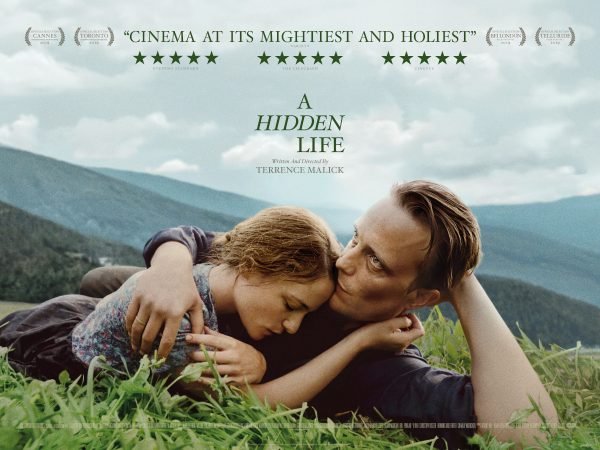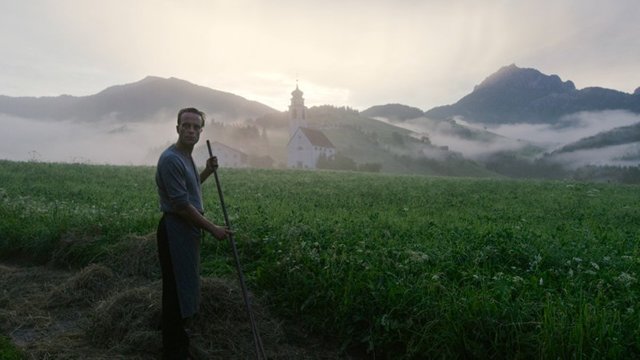"When you've given up hope of escaping death, life lights up."

Terrence Malick has lost none of his habits: close-ups and wide-angle shots, forward dolly shots, counter-scene shots, natural lighting, contemplation of creation, attention to detail and authenticity, voice over, but this one has become less interrogative and obscure. Malick has a script: he tells us the story of Franz Jägerstätter, a farmer from Upper Austria. His luminous pantheism gives way to a more assertive Catholicism. Franz was beatified in 2007.
Jägerstätter was called up for military service in 1940 and after the victory over France he was sent back to his mountain home. These few weeks of indoctrination opened his eyes. He will not serve Hitler. This conviction irritated, then unbearable his entourage. The priest, the bishop, the neighbors, the mayor, all are ganging up on him. To serve one's country and protect one's family is a state duty. If chaplains are forbidden in the SS, they bless the regular troops.
The argument is unstoppable: he endangers his loved ones and his sacrifice will go unnoticed. No one will know anything about it. In fact, he was guillotined in 1943 and forgotten, until 1971 and a documentary by Axel Corti. The Austrian church is divided, doesn't highlighting him risk calling into question the attitude of his comrades, all of whom served at the front? For all that, Franz does not judge anyone and does not call to follow him. He has the deep conviction that he cannot serve Hitler and Jesus. He draws the consequences for himself alone. Only his wife will support his final choice without reservation. His family will survive the war. Franziska died in 2013. Franz is not a political prisoner, tortured by the SS, but a deserter tried by the German army. Shaken, his judge, beautifully played by Bruno Ganz, will commit suicide shortly afterwards.

Malick filmed on the very scene of Franz's life, in his room, his house, his fields, the room of his judgment. The costumes, the tools, the uniforms are period. The gestures are right, they remind us that the life of the peasants was physically hard, wielding the harrow or the scythe breaks the body. The natural light evokes 19th century painting, L'Angelus, La Semeuse ou les Glaneuses by Jean-François Millet, the cows by Rosa Bonheur, or older and religious, La Madeleine à la veilleuse by Georges de La Tour.
The only deviation from the quest for truthfulness is that the characters express themselves in English, keeping German only for Hitler and his henchmen. The purists will cry treason, the realists will deplore a concession to the American market, the idealists will emphasize the universality of the story of this conscientious objection.
The film is transcended by the performance of the couple played by August Diehl and Valerie Pachner, united in joy, work and hardship. Magnificent.
Congratulations @georgeabitbol! You have completed the following achievement on the Steem blockchain and have been rewarded with new badge(s) :
You can view your badges on your Steem Board and compare to others on the Steem Ranking
If you no longer want to receive notifications, reply to this comment with the word
STOPVote for @Steemitboard as a witness to get one more award and increased upvotes!